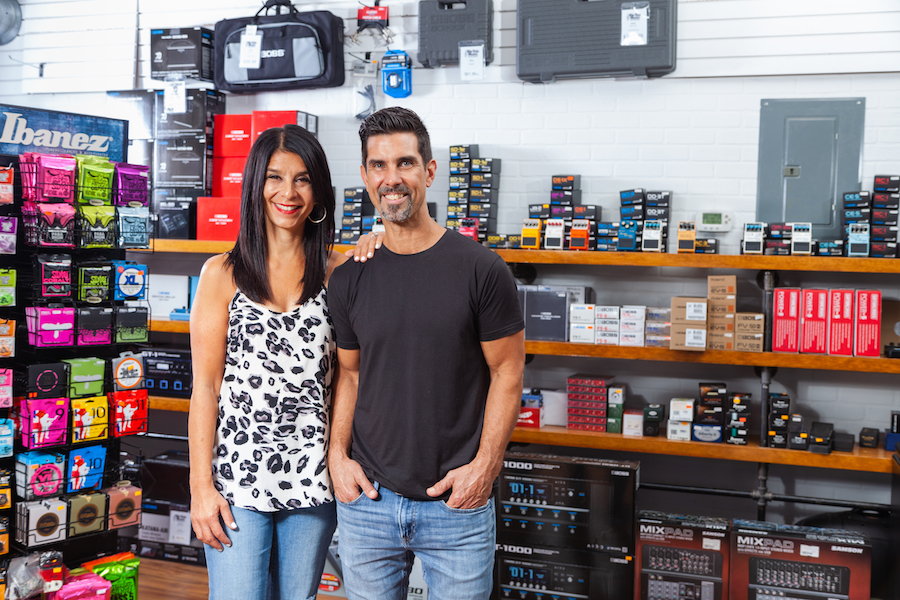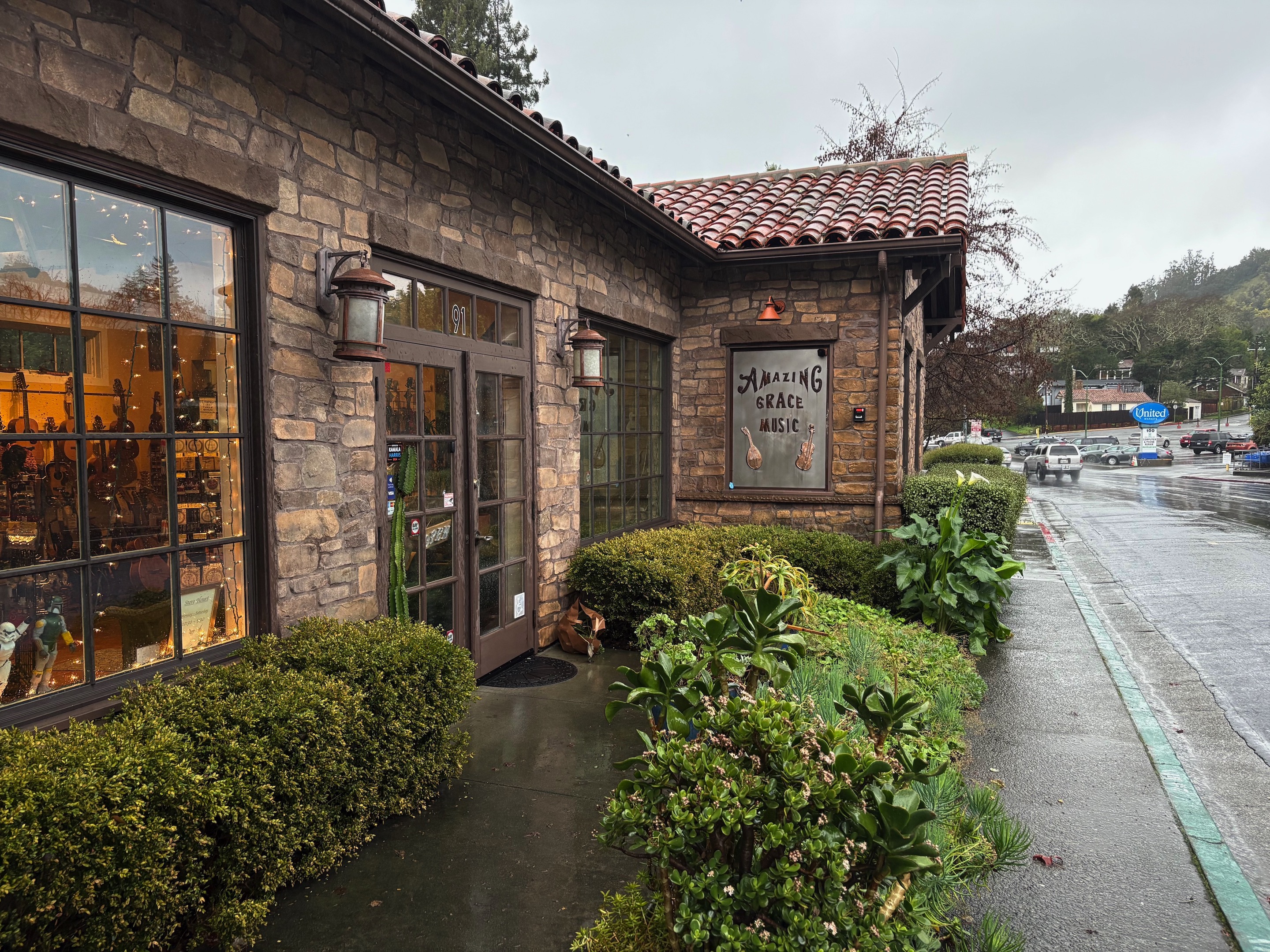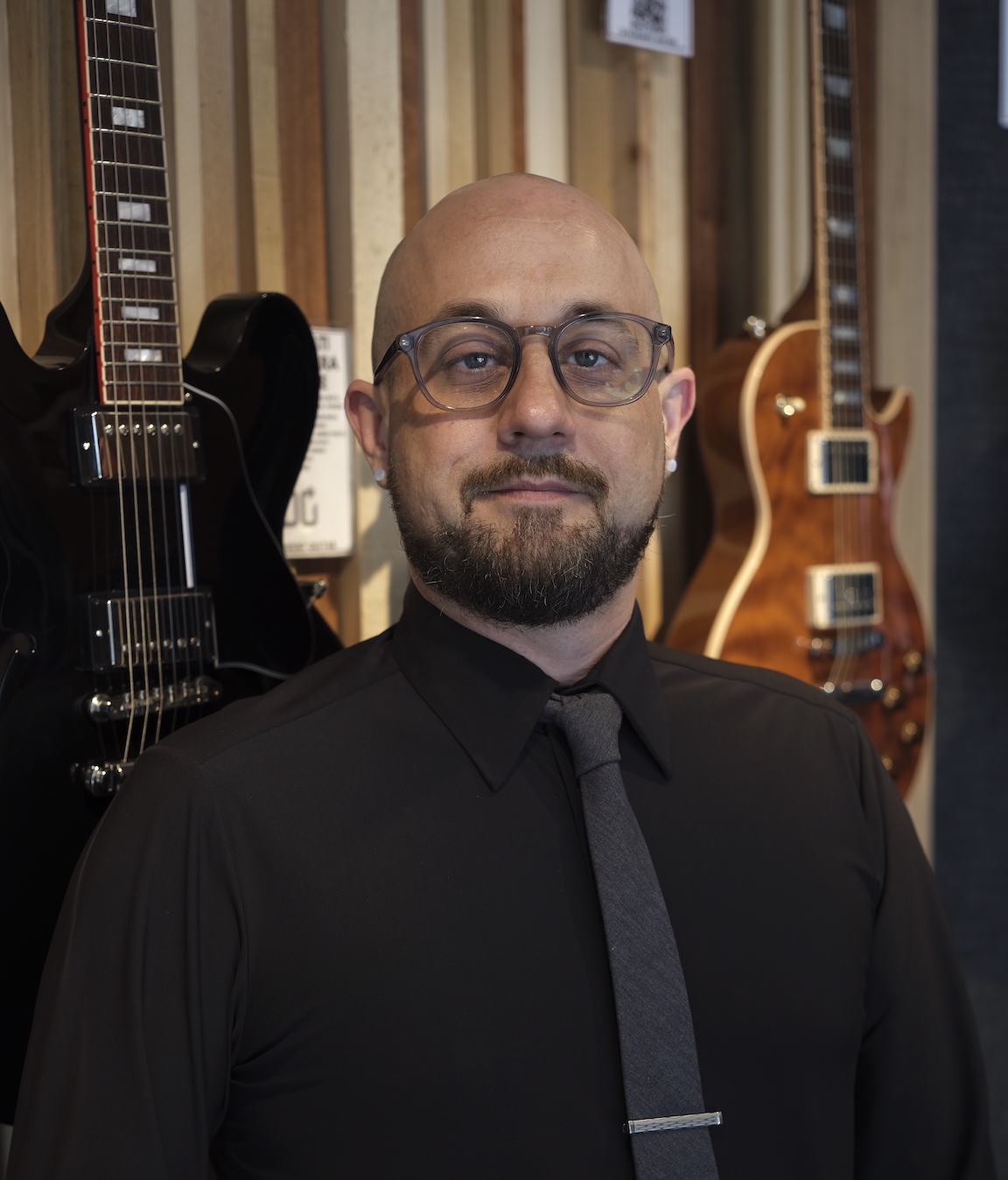
Mike and Miriam Risko
The way Mike Risko got his start in MI is like something out of a movie. As a teenager in the ’80s, he worked at a gas station and between servicing customers, pumping gas, he would practice guitar. “This customer who had all these nice cars came in there,” Risko said. “He said, ‘Hey kid, come here, check this guitar out. I want you to borrow it and try it out.’” It turned out the customer owned a music store in Ossining, New York. “He came back in a month and got the guitar and it was a really cool experience. He asked me to work for him, which I had declined, but I said, ‘If you need a teacher, I’d be interested in teaching.’” Risko did end up teaching at the store.
How Risko met his wife Miriam Risko is, again, like something out of a movie. In 1991, she was a student at NYU and in a band with a friend, and she went to see Mike’s band play in the city. Miriam ended up taking guitar lessons from Mike. “I used to come into this building and shop all the time and buy all my sheet music,” she said. “I’m a singer, but I wanted to learn to play guitar. Mike used to travel to my house and give me guitar lessons. And at a certain point, we each had our own bands and I got this great gig and needed a guitar player for the band. So we ended up playing together.” This blossomed into romance.
By 1997, on his employer’s recommendation, Mike opened up his own school — Mike Risko Music School — right down the street. Risko had been teaching at 144 Croton Ave. and his new teaching studio was at 103 Croton Ave. in Ossining. Miriam came along, teaching piano. Their studio grew from one room to another to taking over the entire floor of the building.
Miriam said, “Then the interesting thing that happened was that there was a leak in the roof and the landlord, because we were renting at the time, came to us and said …” and Mike finished her sentence, “we’ve repaired this roof so many times, we’re just going to actually build another floor on top if you’re interested in renting it.”
The Riskos weren’t sure what to do but decided to take a chance on it. “We wound up building all the rooms out for ourselves,” Mike said. “I was getting up at five in the morning doing construction all day and then teaching until nine o’clock at night [and then] doing more construction.” In the end, they’d built 10 lesson rooms and a performance space.
Meanwhile, Mike had proposed to Miriam. The two were looking for a venue for their wedding when they realized they already had one. “We couldn’t find anything that we loved, and, all of a sudden, when we were in the supermarket one night and we turned to each other and we said, ‘Let’s get married in the music school,’” Miriam said. In June 2000, they did, but their work on the school didn’t stop, not even for that. “The day of our wedding, Mike was teaching lessons and building out rooms in the space. So he taught a lesson in his tuxedo and then walked down the aisle.” Mike added, “We’re hardcore with this and we love what we do.”
A Tutor In Nature
In 2009, the Riskos moved back to 144 Croton Ave., where Mike got his start. That store’s original owner, the guy who had loaned Mike a guitar all those years ago, was looking to sell, and offered it to the Riskos numerous times. They always declined, choosing to focus on music education. But eventually, they agreed. “I said to Miriam, ‘After this next lease, let’s try to buy it,’” Mike said. “It was perfect. It’s a commercial building that’s really cool looking. It has a gigantic parking lot, which is hard to find in a property.”
The Riskos didn’t want to buy the business itself. But the owner offered to just sell them the building, and they took him up on it. This placed the couple in an interesting position because the location was a retail space, and neither of them had any experience in retail.
“We weren’t thinking about getting into retail,” Mike said. “It was something we thought about a little bit, but it wasn’t really on forefront. But we started to go ‘Wait, maybe we should. We’re going to open in this building that was a retail space. Maybe we should start a business as a compliment in our school.’ And that’s basically what happened.”
This is why if you Google “Mike Risko Music” you encounter a range of things. There’s Mike Risko Music School, the original entity. Then there’s Mike Risko Music Store. There’s also Mike Risko Band — the couple, of course, has a band.
Mike Risko Music Store is a full-line dealer, though admittedly a little heavy on what Mike likes best. “I’m a guitar player, so we sell a lot of guitars, pedals, amplifiers, straps, all accessories, keyboards, drum sets,” he said. “We do also sell band-and-orchestra instruments and we also have a huge rental part of our business, too. We rent instruments to school kids.”
Mike describes their operation as five different businesses going on at the same time. “That has been a unique thing; pulling all that together,” he said. Miriam puts it this way: “Where we see a need, we try to fill it.”
The building housing the school and store is 3,000 square feet. The Riskos currently have 30 employees, 25 of which are teachers. They have over 500 students.
Gary Schwartz is one of their teachers. He’s 60 years old and started playing the drums when he was nine, logging a lot of time on the drum stool. He’s played with and done sound for Mike Risko Band. Asked what he does for a living, Schwartz joked, “I have always considered myself a full-time performing drummer [who] teaches on the side 60 hours a week.” He may have a point though — he’s currently in three bands and freelancing with dozens more.
Schwartz described what he feels his strengths are as a drum teacher. “I tend to be a tutor in nature, and I like breaking things down into component parts so that I can play how to do something, how to get to it,” he said. “If [someone doesn’t] currently or yet understand, I listen to [them] explain it or produce a result [so] I can hear what they need in order to take the next step or steps. I’m very well suited to that.”
He said his passion for teaching comes from a very simply place — a love of music itself. “The student, whether they are a young child to a senior citizen, is somebody who is fascinated by and loves music and wants to do a particular thing in music making, specifically, learning how to play drums,” Schwartz said. “They’re excited about something that makes me happy every day, which is music — listening to it and being involved in it, analyzing it, understanding it, rocking out to it, on every level. So we already share that commonality and they want to know how to get there, ostensibly in some form, how to do what I’m doing, even if it’s a different style of music, that doesn’t actually make a difference, but how to be able to assemble a personal level of knowledge and expertise.”
Schwartz estimated that he has a dozen students at present, but said out of hundreds he’s taught over the years, only 35 have gone on to become professional musicians. Nevertheless, he’s very proud of these students.
“They are now people who I can call to send in to recommend for jobs or in some cases to substitute for me,” he said. “I’ve coached their bands that have gone on to some modicum of success. It’s amazing because I get to watch the process and watch them grow. In fact, many of my students will call me to teach their children.”
It’s All Connected
The Riskos make good use of social media, with Facebook pages for the school, store and band, as well as an Instagram page. As to whether or not this drives sales, Miriam describes it as a two-way street. “I think it’s all connected,” she said. “If we’re doing a post about a rock band camp concert and people see participants playing a guitar from the store, it might drive store sales and vice versa. It all helps.”
Asked for the one social media tip she’d give other retailers, Miriam said to be as engaging and inclusive as possible — to post things people can imagine themselves doing. “A lot of our programs are participatory, like you can come see our band,” she said. “We do musical theater, so we’re doing a production of ‘101 Dalmatians’ [and] we invited people to come see it. So being able to see a picture of the performers in a concert or something like that is nice because people [are] not just looking at a post.”
We’re a Rock Band
Ossining, New York, is in Westchester County, which, as Miriam points out, was one of the earliest COVID-19 hot spots in the U.S. “Our doors were actually locked for 90 days,” she said. “Mike and I were allowed to be here because we’re a family-owned business, but we couldn’t have any employees. So we just went into survival mode, and we started working twice as hard to try to reinvent every single aspect of this business to keep it going. We tried to make sure that we just kept moving forward, even though it was frightening.”
The start of the coronavirus quarantine was frightening for everyone, of course, but Miriam elaborated on what their business experienced. “The immediate response to the pandemic was the phones went silent,” she said. “Everything went silent — the lessons, the retail. We were still running our business, but there was no new income coming in. So that part of it was scary. We just wanted to survive.”
Like many companies, Mike Risko Music Store overhauled its website during quarantine, fully committing to e-commerce. According to Mike, 70 percent of the store’s sales are now online.
Further, the quarantine made virtual lessons explode for the school. It had been offering virtual lessons for four years, but found it difficult to get students on board.
“We would have to explain it and do trial lessons with people because they didn’t understand,” Mike said. “They were like, ‘Virtual lessons? What is that?’ And it was like that in the beginning of the pandemic, until the schools also started doing it. Of course [then] there was no more explanation about what virtual lessons were.”
Still, the Riskos did a lot to make them as easy as possible for their students. “We put a lot of things together to help people get better at it,” Mike said. “And that has to do with equipment and logging on and concepts and camera angles and simple facts like that. But people’s reaction — they were grateful that we had found a way to just continue with their weekly lessons with no interruptions.”
It was continually reported throughout the quarantine that instrument sales were exploding because people in lockdown were looking for something to do. But Miriam didn’t feel this was the case in her business. “As far as something being like a quarantine project, I don’t know how much [of] that we’ve seen,” she said. “I think it’s just we get a community of people [who] want to study music. And I think that there’s just more [of that] than usual. Maybe they’re looking for something for their kids to do or they were intrigued by our offerings. But somehow I feel like our music school is definitely busier.”
With COVID-19 came huge challenges in terms of instrument sanitation for all stores. The Riskos adopted an approach that completely circumnavigates the problem. “We used to have guitars come in, we’d inventory them and then we’d hang [them] all up, all over the store, like most guitar stores,” Mike said. “We built recently all these pallet racks, like a warehouse would have. They were in the back of the building. I never thought I’d use them. We took them out, refurbished them, painted them and we have all the guitars now on warehouse racks.”
So Mike Risko Music Store’s customers aren’t coming in and playing guitars at random. They’re encouraged to do their research and make an appointment before going to the store. “A lot of people just know what they want already,” he said. “We’re just pulling a brand new box.”
The Riskos wisely resist the urge to declare the pandemic over. They’ve never lifted mask requirements in their store and do daily temperature checks on employees. “We have a lot of customers that are under the age of 12, and being parents ourselves, we’re very concerned about kids,” Miriam said. The Riskos did, however, attend Summer NAMM in Nashville, where people were largely behaving as if the pandemic never happened. “I really enjoyed being in Nashville,” she said. “It was kind of fine to take the mask off, but we’re still nervous.”
Mike Risko Music Store won Best Community Retail Store in the Top 100 Dealer Awards at Summer NAMM. Listening to the Riskos talk about their community, this award makes sense. “It’s personal,” Miriam said. “We’re really into collaborating and working with other businesses and organizations, and we really believe that if they’re successful, everybody is successful and it’s important to us that we help with our community and make it as great of a place as it can be. The driving of sales I would say is secondary.”
Mike said this comes down to “living your business as much as you can.” Miriam quickly added, “Our motto has always been we never say no to anything. No matter what, if the community needs something, we try to give it to them, however, whatever it is.”
Frequently this involves Mike Risko Band playing community events or the Riskos staging community gatherings in its large parking lot. According to Miriam, tapping into the full use of this lot was one silver lining of the pandemic for the store. “Before COVID, it was a wasted opportunity,” Miriam said. “I’m so happy that we discovered how useful our parking lot is.” The couple has built a small portable stage for the lot that hosts showcases of local musicians and more.
All of this is perhaps why Mike Risko Music recently received the Empire Award from New York State. As for the future, the Riskos plan to stay the course, and perhaps open a second location. One thing’s for sure; they’re going to keep playing. When asked what kind of band Mike Risko Band is, Miriam said it was a cover band, and Mike quickly corrected this. “We’re a rock band.” That’s probably how the kid jamming guitar back at the gas station between filling up gas tanks would want it to be. MI












